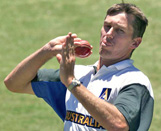COACHING
Mental Fitness
The MIND is strengthened by Exercise, not Rest.Your mind is like your body in more ways than one. If it doesn't get the requisite amount of exercise, it becomes stiff and weak. This in turn leads to poor circulation of ideas and thoughts, excessive and needless tension, hardening of the attitude and an adverse effect on physical fitness.
What according to you is your level of mental fitness?

Glenn McGrath
It can be one of the following three:
HIGH: It means your mental performance is exceptional.
MEDIUM: It means you occasionally put your mind to work and think. You challenge your 'thinking muscles', sometimes.
LOW: It means your mind is like a bowl of vanilla pudding. You are in dire need of a workout! Mental fitness comprises a number of different abilities:
HIGH: It means your mental performance is exceptional.
MEDIUM: It means you occasionally put your mind to work and think. You challenge your 'thinking muscles', sometimes.
LOW: It means your mind is like a bowl of vanilla pudding. You are in dire need of a workout! Mental fitness comprises a number of different abilities:
To reason
To visualize
To imagine
To take decisions
To solve problems
To think clearly and creatively
All this depends on how well and how often you exercise your brain. If you do feel that you are 'out of shape' mentally, you need not despair. You can improve by leaps and bounds by simply taking time out to 'work out' your 'mental muscles'. If you start feeling 'fitter' as a result, then you ought to remember that you need to continue 'exercising' to keep your mind 'in shape'. What stands for the physical aspect, also holds good for the mental!
Let's take a look at what a bowler could do to work on his mental fitness. It's a pretty simple exercise:
MENTAL TOUR
Imagine that you are holding a cricket ball. Visualize the seam of the ball, and how it would look when you grip the ball and point the seam towards the slip cordon. Try to form as clear an image of a fast bowler as you can, for a few moments. For example, think of Glenn McGrath. Now imagine pitching the ball on middle-and-off. Imagine that the ball moves away after pitching and takes the outer edge of the bat. In short, imagine each and every step that someone like McGrath takes once he starts running in to bowl and delivers his trademark outswinger. You can then recollect an instance from your own past wherein you got the outswinger right in a match. You could relive that entire process step-by-step and then ask yourself the following questions:
I got it right once. Can I pitch the ball on the right spot atleast three to four times every over?
What made you pitch the ball on the exact spot?
Why did the ball move away after pitching - what was your grip like?
What needs to be done so that you will do this often?
As you think, pay close attention to the quality of your thoughts.
After having thought for so long, you will realize that the longer you introspected, the more ideas, associations, connections pop into your imagination.
You can perform similar exercises vis-à-vis the inswinger, straighter one or Yorker.
As you go on forming these mental pictures, you delve deeper into your memory and thoughts. In doing so, you shift from one mode of thought to another. This is nothing but 'moving' different mental 'muscles' and strengthening them.